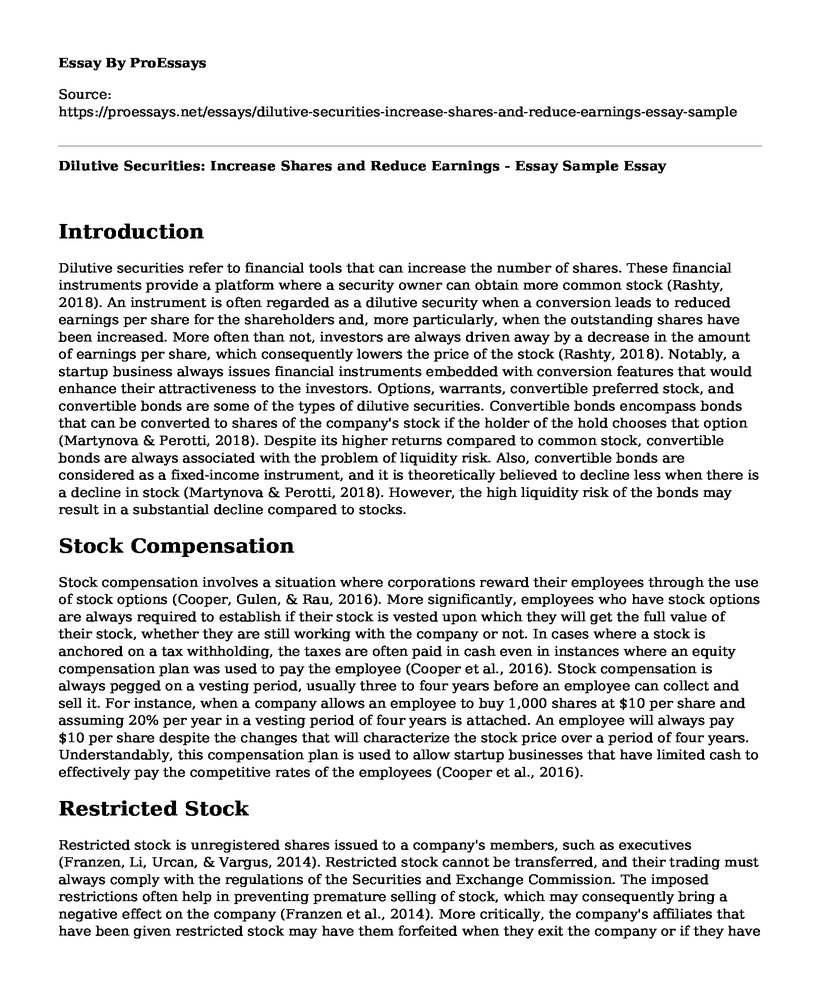Introduction
Dilutive securities refer to financial tools that can increase the number of shares. These financial instruments provide a platform where a security owner can obtain more common stock (Rashty, 2018). An instrument is often regarded as a dilutive security when a conversion leads to reduced earnings per share for the shareholders and, more particularly, when the outstanding shares have been increased. More often than not, investors are always driven away by a decrease in the amount of earnings per share, which consequently lowers the price of the stock (Rashty, 2018). Notably, a startup business always issues financial instruments embedded with conversion features that would enhance their attractiveness to the investors. Options, warrants, convertible preferred stock, and convertible bonds are some of the types of dilutive securities. Convertible bonds encompass bonds that can be converted to shares of the company's stock if the holder of the hold chooses that option (Martynova & Perotti, 2018). Despite its higher returns compared to common stock, convertible bonds are always associated with the problem of liquidity risk. Also, convertible bonds are considered as a fixed-income instrument, and it is theoretically believed to decline less when there is a decline in stock (Martynova & Perotti, 2018). However, the high liquidity risk of the bonds may result in a substantial decline compared to stocks.
Stock Compensation
Stock compensation involves a situation where corporations reward their employees through the use of stock options (Cooper, Gulen, & Rau, 2016). More significantly, employees who have stock options are always required to establish if their stock is vested upon which they will get the full value of their stock, whether they are still working with the company or not. In cases where a stock is anchored on a tax withholding, the taxes are often paid in cash even in instances where an equity compensation plan was used to pay the employee (Cooper et al., 2016). Stock compensation is always pegged on a vesting period, usually three to four years before an employee can collect and sell it. For instance, when a company allows an employee to buy 1,000 shares at $10 per share and assuming 20% per year in a vesting period of four years is attached. An employee will always pay $10 per share despite the changes that will characterize the stock price over a period of four years. Understandably, this compensation plan is used to allow startup businesses that have limited cash to effectively pay the competitive rates of the employees (Cooper et al., 2016).
Restricted Stock
Restricted stock is unregistered shares issued to a company's members, such as executives (Franzen, Li, Urcan, & Vargus, 2014). Restricted stock cannot be transferred, and their trading must always comply with the regulations of the Securities and Exchange Commission. The imposed restrictions often help in preventing premature selling of stock, which may consequently bring a negative effect on the company (Franzen et al., 2014). More critically, the company's affiliates that have been given restricted stock may have them forfeited when they exit the company or if they have failed to achieve set goals. Restricted stock is often associated with the timing of sale conditions, which are intended to insulate the company from adverse effects when they are traded (Franzen et al., 2014). Moreover, it is preferred by established companies that seek to motivate their employees to achieve organizational goals. Concerning the difference between restricted stock and stock compensation plan, the company often forfeits the stock when an employee leaves the company in the case of restricted stock (Franzen et al., 2014). Conversely, in a stock compensation plan, startup businesses often allow an employee to buy stocks at a certain price and are unaffected by the changing stock price in the future.
References
Cooper, M. J., Gulen, H., & Rau, P. R. (2016). Performance for pay? The relation between CEO incentive compensation and future stock price performance. The Relation Between CEO Incentive Compensation and Future Stock Price Performance (November 1, 2016). https://papers.ssrn.com/sol3/papers.cfm?abstract_id=1572085
Franzen, L., Li, X., Urcan, O., & Vargus, M. E. (2014). The market response to insider sales of restricted stock versus unrestricted stock. Journal of Financial Research, 37(1), 99-118. https://onlinelibrary.wiley.com/doi/abs/10.1111/jfir.12030
Martynova, N., & Perotti, E. (2018). Convertible bonds and bank risk-taking. Journal of Financial Intermediation, 35, 61-80. https://www.sciencedirect.com/science/article/abs/pii/S1042957318300081
Rashty, J. (2018). Changes to Accounting for Employee Share-Based Payment: ASU 2016-09 May Increase Volatility of Diluted EPS. The CPA Journal, 88(3), 56-59. https://josefrashty.com/uploads/3/4/1/9/34190589/2018-3_stk_comp_tcpaj.pdf
Cite this page
Dilutive Securities: Increase Shares and Reduce Earnings - Essay Sample. (2023, Mar 23). Retrieved from https://proessays.net/essays/dilutive-securities-increase-shares-and-reduce-earnings-essay-sample
If you are the original author of this essay and no longer wish to have it published on the ProEssays website, please click below to request its removal:
- Fundraising Plan for No Name Nonprofit
- Insurance Essay Sample: Moral Hazard
- Analysing Financial Information
- Financial Analysis of Apple Company Paper Example
- Essay Sample on Financial Education: A Key to Lowering Global Poverty Rate
- Essay Sample on Universal Taxation in Education: A Necessity for All
- Essay Example on Regression Model for Stock Price Dividing







